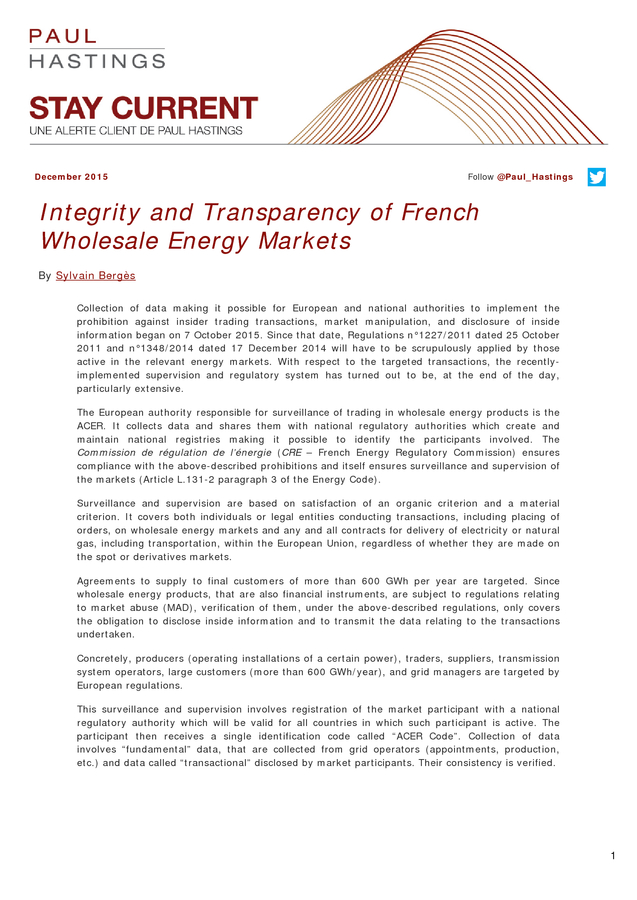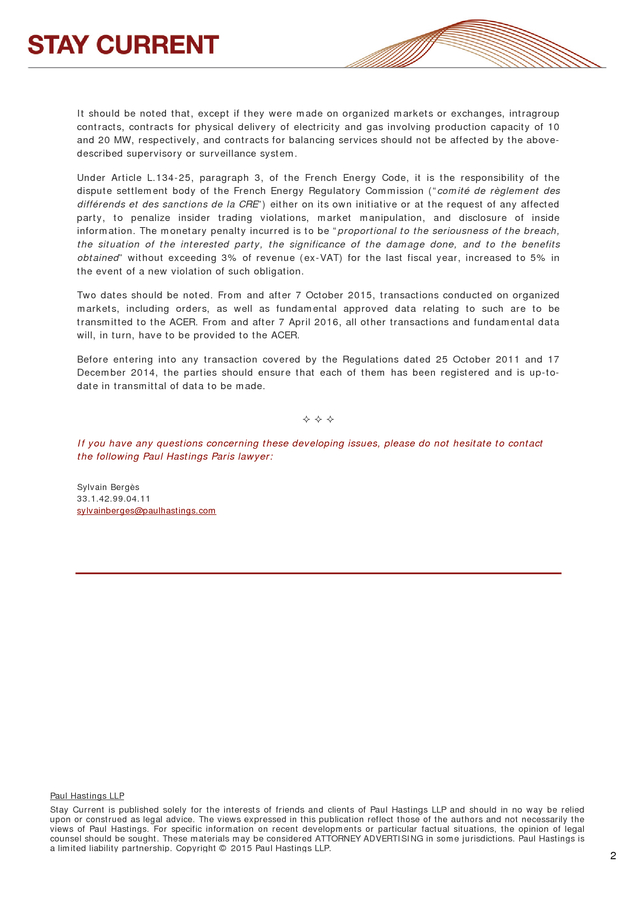Description
December 2015
Follow @Paul_Hastings
Integrity and Transparency of French
Wholesale Energy Markets
By Sylvain Bergès
Collection of data making it possible for European and national authorities to implement the
prohibition against insider trading transactions, market manipulation, and disclosure of inside
information began on 7 October 2015. Since that date, Regulations n°1227/2011 dated 25 October
2011 and n°1348/2014 dated 17 December 2014 will have to be scrupulously applied by those
active in the relevant energy markets. With respect to the targeted transactions, the recentlyimplemented supervision and regulatory system has turned out to be, at the end of the day,
particularly extensive.
The European authority responsible for surveillance of trading in wholesale energy products is the
ACER. It collects data and shares them with national regulatory authorities which create and
maintain national registries making it possible to identify the participants involved.
The Commission de régulation de l’énergie (CRE – French Energy Regulatory Commission) ensures compliance with the above-described prohibitions and itself ensures surveillance and supervision of the markets (Article L.131-2 paragraph 3 of the Energy Code). Surveillance and supervision are based on satisfaction of an organic criterion and a material criterion. It covers both individuals or legal entities conducting transactions, including placing of orders, on wholesale energy markets and any and all contracts for delivery of electricity or natural gas, including transportation, within the European Union, regardless of whether they are made on the spot or derivatives markets. Agreements to supply to final customers of more than 600 GWh per year are targeted. Since wholesale energy products, that are also financial instruments, are subject to regulations relating to market abuse (MAD), verification of them, under the above-described regulations, only covers the obligation to disclose inside information and to transmit the data relating to the transactions undertaken. Concretely, producers (operating installations of a certain power), traders, suppliers, transmission system operators, large customers (more than 600 GWh/year), and grid managers are targeted by European regulations. This surveillance and supervision involves registration of the market participant with a national regulatory authority which will be valid for all countries in which such participant is active.
The participant then receives a single identification code called “ACER Code”. Collection of data involves “fundamental” data, that are collected from grid operators (appointments, production, etc.) and data called “transactional” disclosed by market participants. Their consistency is verified. 1 .
It should be noted that, except if they were made on organized markets or exchanges, intragroup contracts, contracts for physical delivery of electricity and gas involving production capacity of 10 and 20 MW, respectively, and contracts for balancing services should not be affected by the abovedescribed supervisory or surveillance system. Under Article L.134-25, paragraph 3, of the French Energy Code, it is the responsibility of the dispute settlement body of the French Energy Regulatory Commission (“comité de règlement des différends et des sanctions de la CRE”) either on its own initiative or at the request of any affected party, to penalize insider trading violations, market manipulation, and disclosure of inside information. The monetary penalty incurred is to be “proportional to the seriousness of the breach, the situation of the interested party, the significance of the damage done, and to the benefits obtained” without exceeding 3% of revenue (ex-VAT) for the last fiscal year, increased to 5% in the event of a new violation of such obligation. Two dates should be noted. From and after 7 October 2015, transactions conducted on organized markets, including orders, as well as fundamental approved data relating to such are to be transmitted to the ACER. From and after 7 April 2016, all other transactions and fundamental data will, in turn, have to be provided to the ACER. Before entering into any transaction covered by the Regulations dated 25 October 2011 and 17 December 2014, the parties should ensure that each of them has been registered and is up-todate in transmittal of data to be made.  If you have any questions concerning these developing issues, please do not hesitate to contact the following Paul Hastings Paris lawyer: Sylvain Bergès 33.1.42.99.04.11 sylvainberges@paulhastings.com Paul Hastings LLP Stay Current is published solely for the interests of friends and clients of Paul Hastings LLP and should in no way be relied upon or construed as legal advice.
The views expressed in this publication reflect those of the authors and not necessarily the views of Paul Hastings. For specific information on recent developments or particular factual situations, the opinion of legal counsel should be sought. These materials may be considered ATTORNEY ADVERTISING in some jurisdictions.
Paul Hastings is a limited liability partnership. Copyright © 2015 Paul Hastings LLP. 2 .
The Commission de régulation de l’énergie (CRE – French Energy Regulatory Commission) ensures compliance with the above-described prohibitions and itself ensures surveillance and supervision of the markets (Article L.131-2 paragraph 3 of the Energy Code). Surveillance and supervision are based on satisfaction of an organic criterion and a material criterion. It covers both individuals or legal entities conducting transactions, including placing of orders, on wholesale energy markets and any and all contracts for delivery of electricity or natural gas, including transportation, within the European Union, regardless of whether they are made on the spot or derivatives markets. Agreements to supply to final customers of more than 600 GWh per year are targeted. Since wholesale energy products, that are also financial instruments, are subject to regulations relating to market abuse (MAD), verification of them, under the above-described regulations, only covers the obligation to disclose inside information and to transmit the data relating to the transactions undertaken. Concretely, producers (operating installations of a certain power), traders, suppliers, transmission system operators, large customers (more than 600 GWh/year), and grid managers are targeted by European regulations. This surveillance and supervision involves registration of the market participant with a national regulatory authority which will be valid for all countries in which such participant is active.
The participant then receives a single identification code called “ACER Code”. Collection of data involves “fundamental” data, that are collected from grid operators (appointments, production, etc.) and data called “transactional” disclosed by market participants. Their consistency is verified. 1 .
It should be noted that, except if they were made on organized markets or exchanges, intragroup contracts, contracts for physical delivery of electricity and gas involving production capacity of 10 and 20 MW, respectively, and contracts for balancing services should not be affected by the abovedescribed supervisory or surveillance system. Under Article L.134-25, paragraph 3, of the French Energy Code, it is the responsibility of the dispute settlement body of the French Energy Regulatory Commission (“comité de règlement des différends et des sanctions de la CRE”) either on its own initiative or at the request of any affected party, to penalize insider trading violations, market manipulation, and disclosure of inside information. The monetary penalty incurred is to be “proportional to the seriousness of the breach, the situation of the interested party, the significance of the damage done, and to the benefits obtained” without exceeding 3% of revenue (ex-VAT) for the last fiscal year, increased to 5% in the event of a new violation of such obligation. Two dates should be noted. From and after 7 October 2015, transactions conducted on organized markets, including orders, as well as fundamental approved data relating to such are to be transmitted to the ACER. From and after 7 April 2016, all other transactions and fundamental data will, in turn, have to be provided to the ACER. Before entering into any transaction covered by the Regulations dated 25 October 2011 and 17 December 2014, the parties should ensure that each of them has been registered and is up-todate in transmittal of data to be made.  If you have any questions concerning these developing issues, please do not hesitate to contact the following Paul Hastings Paris lawyer: Sylvain Bergès 33.1.42.99.04.11 sylvainberges@paulhastings.com Paul Hastings LLP Stay Current is published solely for the interests of friends and clients of Paul Hastings LLP and should in no way be relied upon or construed as legal advice.
The views expressed in this publication reflect those of the authors and not necessarily the views of Paul Hastings. For specific information on recent developments or particular factual situations, the opinion of legal counsel should be sought. These materials may be considered ATTORNEY ADVERTISING in some jurisdictions.
Paul Hastings is a limited liability partnership. Copyright © 2015 Paul Hastings LLP. 2 .













